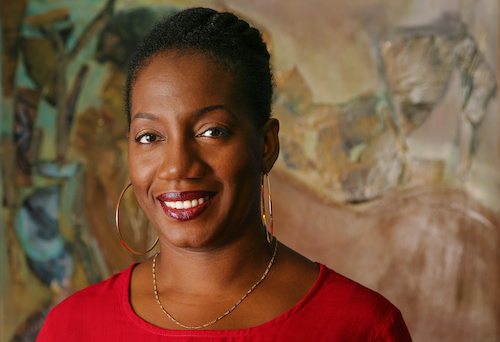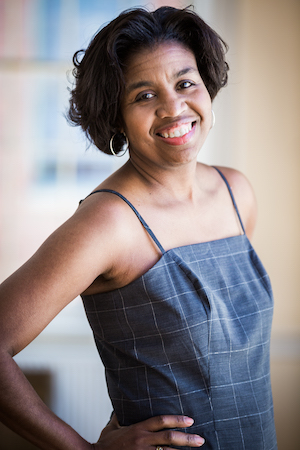The Conference is fortunate this year to have two much admired and celebrated poets as Spotlight Readers—Teri Ellen Cross Davis and January Gill O’Neil. Check out their bios here.
The poets will read for us from their work. Here’s a glimpse into what they had to say about poetry and their process in recent interviews.
TERI ELLEN CROSS DAVIS

Interviewer: You play [in Haint] with form in the poem “The small of my back (your hand here)”– best poem title ever!–with the shape of the verse on the page. “One Night Stand” uses the Golden Shovel form created by Terrance Hayes. “Scar Tissue” the Bop form. How do you come to these kinds of poems–material first, form first?
TECD: Each of these poems came about differently. With “the small of my back (your hand here)” I just HAD to play with form. The poem almost called for it and it was so much fun to do. “One Night Stand” began in that form and was only crafted to be in that form. And “Scar Tissue” evolved, as I knew I wanted to try out the form and wanted to pay homage to a song that was a favorite of mine (and my dad) as a child. But funny enough, it also takes the title from a favorite Red Hot Chili Peppers song, so it was a way to pay homage to the music and experiences that shaped me.
Interviewer: A couple of poems in your collection were written after songs—one after “Seasons” by the artist formerly known as Terence Trent D’Arby. How do music and poetry work together for you? How about visual art and poetry?
TECD: I always have music on—in my car, in my home, in my office, always. I also grew up in a household full of music, from The Temptations and Led Zeppelin to Steely Dan and Crosby, Stills, Nash, and Young. Songs create tiny movies of emotion in me, and I love to dive into the rise and fall of the music and the lyrics. Words come next, to explain, to capture those emotions on the page, to help me sift through what the song has done to me. It creates a truly fulfilling loop as I cannot play an instrument and have not sung in a choir since my teen years.
So if words are my instrument, then they are what I will bring to all the whirlwind and kaleidoscope of emotions that music stirs up inside me.
It is the same with visual art. Some of the poems in HAINT are responses to the book, The Black Female Body: A Photographic History by Deborah Willis and Carla Williams. I took the book with me to Virginia Center for Creative Arts for a residency in 2015, and it helped me write the last poems of HAINT. I have such emotional responses to all art, and poetry allows me to harness and mine those response for poems.
From Rebecca Moon Ruark, “My interview with award-winning poet Teri Ellen Cross Davis,” Rust Belt Girl, October 2, 2019.
JANUARY GILL O’NEIL

Interviewer: . . . At this stage in your life what have you learned about yourself as a poet?
JGON: Well, I would always say that I look for the extraordinary in the ordinary. That’s been sort of my theme from the first book onward. When the pandemic hit, not being able to go anywhere or do anything, it was a test to look for the extraordinary in the ordinary—everyday. It was a constant cycle of trying to get to a state of joy.
It is work to try to see the world anew, especially because it will disappoint you at every turn. But it is worth it to walk outside on a cold day and see a bud on a tree that you didn’t expect to see that morning. I think poets are lucky because we get the opportunity to examine the minutiae of life and question it.
From Joseph O. Legaspi, “Nothing You Expect: Joseph O. Legaspi Interviews January Gill O’Neil,” The Common Online: Interviews, January 8, 2024. https://www.thecommononline.org/nothing-you-expect-joseph-o-legaspi-interviews-january-gill-oneil/
Interviewer: . . . Talk about your goals when you start a new poem. Where do the words and ideas come from? What are you hoping to create?
JGON: . . . We don’t talk about failure enough as a culture, do we? We have to be willing to take a risk in our work, and that means risking failure: having the poem collapse and not be able to salvage it. Putting in all that effort only to get to the conclusion and have a “so-what” moment. We go to poetry to be changed, and if that doesn’t happen in some small way, then so what? Why write this? Why read it? Maybe the writer hasn’’t decided how to end the poem. It might mean going deeper into unfamiliar territory—saying that unsayable thing. All of it is a risk. All of it signals disaster.
But, we don’t grow as writers if we’re not willing to suck now and then. I’m an optimist, so maybe that sucking sound means I’m bored with myself and am ready to rise to a new level in my poetry. Maybe the piece needs a good revision; I need to leave my ego at the door. The breakthrough is the hardest part. Writers have to say the unsayable thing. They have to be willing to fail.
From Maurice Carlos Ruffin, “The Interview with January Gill O’Neil,” Sitting in Silence, September 7, 2022.
